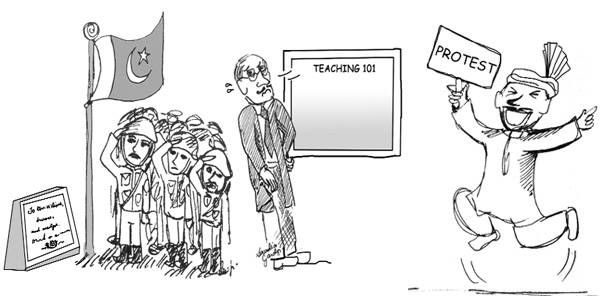
Terror and error
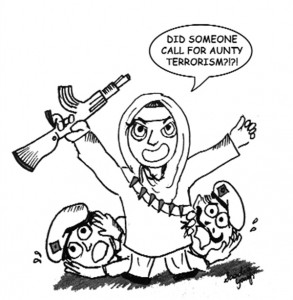
Sir,
Legislation should be drafted and enforced carefully. Broad terms in legislation lead to broader interpretation and misapplication. For example, the definition of terrorism in Pakistan’s anti-terror laws is so broad that even cow theft can be tried under them.
A more common recent phenomenon is to try simple murder under both the Pakistan Penal Code and the Anti-terrorism Act. The recent case of a famous politician’s son killing an innocent young passer-by in angry shooting that followed a small road accident in Lahore is one such example. He is a murderer, and has confessed to killing a youngster in a court of law. He has been charged under both the PPC and the ATA for the offense. My question is, why is the ATA applied to such murders when the PPC alone can serve the purpose of justice with capital punishment? The terrorism legislation applies to death caused by an act of terrorism, but do such murders instigate terror in the society?
That is why there is a very low conviction rate in ATA cases. The courts adjudge the accused on the basis of questions of fact and questions of law. Facts are in themselves often hard to establish, but the misapplication of law makes the conviction much harder. And when the accused is set free, the courts are blamed for poor decisions.
There are several reasons why the law is applied to cases that should not fall under its ambit. Primarily, the law allows the state to become a party to an offense. At other times, there is an expectation of stricter punishment under anti-terrorism laws. Sometimes it is just because of poor prosecution. But if the purpose is to ensure justice for the aggrieved party, then applying ATA to murder cases does more harm than good. Stats show that approximately 10 percent of the cases registered under ATA are withdrawn by the police itself during investigation.
Law enforcement agencies need to have a sound understanding of law so that they can charge a person under the correct provisions. Even the Supreme Court has raised concern that the ATA needs to be reexamined in a manner that the special law is meticulously and thoroughly examined for effective implementation. The low conviction rate under the ATA is something the police should consider when framing charges. Our general laws are adequate for most regular criminal offenses. Applying special laws does not always help prosecution. It may complicate the case and also raises legal concern.
Shahzad Atta,
Lahore.
Minority report
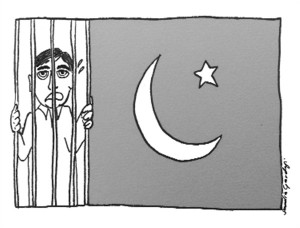
Sir,
Despite being assured of religious liberty and freedom of worship in the constitution, in the United Nations conventions ratified by Pakistan, and in the 15th August 1948 speech of Quaid-e-Azam, minorities live in constant fear.
Since the beginning of Gen Zia’s Islamization process, the gulf between the majority and minority communities has continued to increase, resulting in growing intolerance and faith based violence. The rise of radical groups in the country has added fuel to the fire, with decrees and sermons inciting violence against people because of their religious beliefs.
Attacks on Hindu temples, Christian churches, and business establishments and residential colonies of minorities have become common. Last year, there were attacks on temples in Larkana and Hyderabad, and another temple in Tando Mohammad Khan was burned down. The recent attack on two churches in Lahore, killing about 15 people, has increased the Christian community’s concerns about their security.
There has also been an increase in the incidents of robbing, kidnapping and forcibly converting people from minority faiths. The forced conversion of Pooja and Rinkle Kumari in 2013, and the recent attempt to convert Anjali Meghwar by force are indicative of a growing trend.
In 2014, five school children belonging to the Hindu community were kidnapped by radical elements in Balochistan and were released after three days. Kamlesh Kumar, a Hindu student of Mehran University in Jamshoro, went missing six months ago.
Minorities have been deprived of their right to own land and made to work as slaves for landlords throughout Pakistan, especially in Sindh. Some of these individuals are forced to work on farmland owned by their ancestors.
During the drought in Tharparkar last year, there were concerns that the poor response to the famine – as hundreds of people, including children, starved to death – was a case of religious discrimination.
Christians have faced similar incidents of lynching, torture, and false allegations of blasphemy all over Pakistan. The horrible recent act of a mob burning a Christian couple alive in Kot Radhakishan is one such example.
Therefore, starting a discussion on making new laws to protect minorities is the need of the hour.
Bhagwan Bhatti,
Hyderabad.
Teaching 101
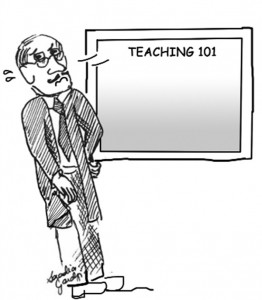
Sir,
The subject-based questioning session had gone well. A gentleman from the interviewers panel raised his eyebrow and a question in concern: “Would you be able to tackle rowdy students or a ruckus in a classroom?” I knew where it was coming from. My resume didn’t boast of experience as a teacher and I talked fairly with a non-professional stance, more like that of an enthusiast eager to take on the world of education, perhaps like a dreamer hallucinating to rainbows shining out of grays. To them I was soft spoken, naïve and surely couldn’t be expected to keep students in place while lecturing. I told them bluntly: I didn’t want to. I just wanted to make the learning process easier for them and that is what I would get paid for.
Our pedagogical strategy is but a depraved version of the Socratic method. The teacher is the ‘sole sage on the stage’ with all rights to classroom dialogue and he may play the devil’s advocate as he pleases: ‘‘If you affirm it, I deny it. If you deny it, I affirm it’’. Since nobody wants interference in the drilled lecture, snubbing is sometimes the tactic of choice. To literati this strategy favors rote learning and promotes God knows what sort of futile discipline.
There should be no shame for a teacher in admitting his loss of words or ideas or in honest redirection of inquisitive minds to reliable information sources. Upon encountering uncertainty or a retrieval block during a discussion, a teacher should take to valid negotiation instead of taking offense. Very few teachers view imparting education as a two way knowledge exchange and even fewer categorize themselves as learners.
Would revamping this phenomenon be too much to ask for? How about looking at ‘studentship’ as ‘apprenticeship’ mentored by an experienced, knowledgeable figure provoking and promoting skillful learning in class?
Here’s a superficial view of what often goes awry behind the rostrum.
The striving part timers: Some of them are excelling at work while some are working hard to strike a balance. Switching between the jobs is never easy and comes with consequences. Nobody can tell that widely dreaded biology lecturer is drowned in woes herself. She works late on her research project and relies on caffeine shots to show up early for the class. Yesterday, the lab centrifuge cracked and broke open, destroying her samples. She can’t possibly tell you that, but she can make you stand in the trash bin upon the slightest signs of you giving up on her words.
Tip: or she can try to be little less impatient.
The overtly ambitious graduates: Alright so your physics teacher had been a trophy student, went on a trip to CERN where he met the Hadron Collider he can’t ever forget, keeps mentioning it over and over while lecturing and leaves you clueless as to what actually the atomic model under discussion proposed. You are not alone and it is not your fault. Yes, teachers essentially should keep track of the standard they are entertaining.
The misfits: The teacher with the awesomely gregarious personality, the one that makes an hour of class flutter away in vagabond tales of adventures or in gossips of shopping sprees, mark my words, would later dawn upon your aesthetics as bitter as hemlock. Do not, I repeat do not let go of regular lecture at any cost. Discourage glib talk and be your own savior! As you would expected to be in the exam hall.
The old timers: Since 21st century is pivoted around World Wide Web, the italicized old school notes might be handsomely crafted but mastering the ever evolving software is far more important. Seniors are compassionate, let’s make them upbeat and let’s make ‘knowing’ our foremost priority.
Wajiha Imtiaz,
Islamabad.
April 13
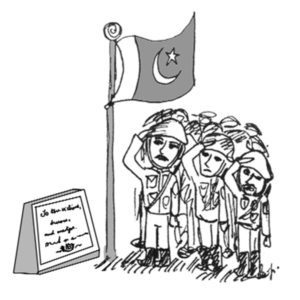
Sir,
About 1,200 civilians were killed in Jallianwala Bagh in Amritsar on 13th April 1919 – the day of Besakhi – by soldiers under the command of a British general. At least 1650 rounds were fired in 10 minutes to disperse a public meeting of about 20,000 people. They had gathered to protest against the arrest of their leaders Barrister Saifuddin Kitchlew and Doctor Satyapal for alleged provocation of extraordinary violence in the city during a nationwide agitation against authoritarian powers that the government retained even after the end of the First World War.
The policy was vehemently opposed by Indian leaders, including Jinnah. Consequently there were large scale disturbances in Punjab, which were suppressed with ruthless measures including an air raid on Gujranwala. These incidents left a deep impact on the country. “Plassey laid the foundation of the British Empire, Amritsar has shaken it,” said Gandhi. A book written by British author Alfred Draper was titled ‘Amritsar: the massacre that ended the Raj’.
The stage for these protests was set by Kitchlew, a dynamic 35-year-old leader who was the secretary of the Muslim League as well as the Indian National Congress in the second biggest city of northwest India. Following him, people demonstrated unity, transcending political and religious affiliations.
Leaders of Muslim League and Congress held simultaneous annual party sessions in Amritsar in December 1919. The then Governor of the Punjab was also a villain in this episode, as he believed that it was a rebellion to be dealt with sternly. He was murdered in 1940 by Udham Singh.
While the event of Jallianwala Bagh is commemorated annually in India, it is time we start doing the same in Pakistan. It is our shared history of sacrifices that we made to achieve independence.
Taraq Jazy,
Islamabad.
Down with dowry
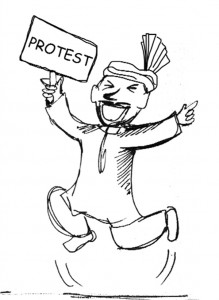
Sir,
Dowry has become a fundamental part of our marriage customs. The tradition may have its roots in the fact that women were denied inheritance and had to be compensated through dowry, but in the present times, it has become a tool for violating women’s dignity.
The concept has nothing to do with Islam either. Even culturally, a man is expected to look after his wife’s financial needs and not the other way round. The only financial exchange during marriage sanctioned by Islam is haq meher, the dower to be paid by a man to his wife. But it rejects the idea of burdening either party. That is why it recommends the simple ritual of Nikah to bind two people in marriage.
We criticize the world, our political system, and our culture for this ritual, but we are ourselves to be blame if we do not discontinue this practice.
Muzna Akbar,
Lahore.
Heavy price
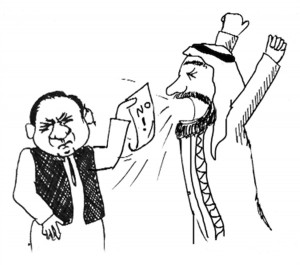
Sir,
Two very significant and extraordinary events have unfolded in Pakistan over the last few days. The Parliament of Pakistan declared its neutrality in the Yemen war, and UAE’s foreign minister issued a warning to Pakistan for doing so.
Draped in no uncertain words, the arrogant, harsh and brazen warning of Dr Gargash exposes the true contours of the Arab mind – often concealed by superfluous layers of deceptive brotherly veneer. Pakistanis therefore have a good reason to thank Gargash for his mindless utterings. He expects a responsible state to join a coalition of belligerent pirates in attacking a small ship. Gargash threatens that not doing so will result in Pakistan ‘paying a heavy price’.
Here are a few suggestions that may help Gargash and his Arab co-aggressors to operationalize their warning in a civilized manner.
Insignificant as it might appear to the naive, the first action ought to be for the entire chain of Arab Sheikhs to unanimously pledge putting an end to their annual appearances in Pakistan for the sole purpose of destroying Houbara bustards. This would include a commitment to surrender all those who violated the law by killing birds far in excess of their authorized quota.
Needless to say, not eating Houbara meat, even for one season, may have a salutary deflating effect on the agitated Arab nerves and may even persuade the ‘gung ho’ coalition to reconsider its uncalled-for aggression on Yemen.
Arabs have a legitimate demand for pay-back, but only from the seminaries and groups who have been doled out religious charity over all these years. It is not Pakistan but the managers of these seminaries and other recipients who must come to the rescue of their donors. It would be appropriate for the Arabs to disclose the list of all such seminaries and groups who received these gracious under-the-table offerings. Pakistan could then promptly oblige by dispatching the recipients to their respective donors – preferably on permanent basis.
The third punitive step could be to seize the billions of dollars that have been siphoned and deposited by our ruling class in UAE and other Arab countries. This could be a win-win situation. Not only would it make our rulers more egalitarian, it will also put an end to the dynastic politics of Pakistan, which thrives on plundered wealth.
How come countries with such formidable military armadas are not willing to sacrifice a single soldier of their own in a conflict that in their perception has endangered their very survival? Have they not read in the newspapers the number of soldiers that Pakistan lost in its own war of survival?
So the fourth immediate step that ought to be taken by the Arabs is to think and behave like ordinary humans and remember that there is also a ‘heavy price to pay’ for a false sense of pride and treating others with contempt.
Naeem Sadiq,
Karachi.

